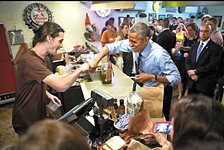Point Austin: In Memory
The dead we remember, and the lessons we still need to learn
By Michael King, Fri., June 3, 2016

A few weeks ago, in connection with the Vietnam War Summit at the LBJ School, a half-size, traveling version of the Vietnam Veterans Memorial Wall stood just outside the LBJ Library. I've visited the original wall in D.C. – it's a sobering, even overwhelming experience, both for the strikingly eloquent design and the mortal substance. The reduced version carries a surrealistic touch, an out-of-town rendition of the real thing, like a diminished local production of a Broadway show.
The wall commemorates the more than 58,000 official U.S. military fatalities of the war, and does not attempt to address the staggering numbers of deceased Vietnamese, Cambodians, and Laotians – perhaps 3 million or more, although "incalculable" is nearer the mark. Nevertheless, another curious aspect of the symposium was the appearance (over some exile protest) of Vietnamese Ambassador Pham Quang Vinh, whose address was deeply conciliatory, pointing toward a new relationship with the United States.
As a small country long accustomed to precarious independence, particularly under the shadow of nearby China, Vietnam has learned to navigate between adversaries. Accordingly, it was no surprise that the headlined U.S. initiative announced during President Barack Obama's recent visit was the final lifting of the ban on U.S. arms sales – a mixed message indeed, in light of recent history. The great powers maneuver, and the small powers watch and wait.
Shared Responsibility
I was reminded of all this again last week, by the near coincidence of Memorial Day with the visit of Obama to Hiroshima, the first sitting U.S. president to make that pilgrimage. The U.S. media reverberated with the fake and misleading question – Will Obama apologize for the bomb? – with virtually no one wondering about the reaction of the Japanese, who would be presumed to take what they could get. They received no "apology" – not only because of militarized domestic U.S. politics, but because: What apology could possibly suffice? Obama instead made several small gestures – embracing survivors, leaving two handmade origami peace cranes – and on the bomb site, he delivered a reflective speech about the consequences of war and the need to strive for peace.
Like all such speeches on the subject from U.S. officials, it was couched in ambivalence and passivity, as though the bomb was something that happened to the U.S. rather than something we did, for good or ill. I won't attempt to rehash the historical arguments over Hiroshima and Nagasaki – readers can draw their own conclusions – but whatever those conclusions, in a larger sense, nuclear weapons are indeed something that has happened to all of us as world citizens, with the long-term consequences still in the balance.
Obama's speech considered those consequences, and the potential human responses. "Seventy-one years ago, on a bright cloudless morning," he began, "death fell from the sky and the world was changed. A flash of light and a wall of fire destroyed a city and demonstrated that mankind possessed the means to destroy itself." Further on, he recalled the particular suffering endured that day, and "all the innocents killed across the arc of that terrible war and the wars that came before and the wars that would follow.
"Mere words cannot give voice to such suffering," Obama continued, "but we have a shared responsibility to look directly into the eye of history and ask what we must do differently to curb such suffering again."
A Noble Ambition
The president's speech remained in mind as Memorial Day arrived, with its inevitable ceremonies and homilies, and beneath them the continuing knowledge that young men and women have always died in service to the whims, ideologies, and judgments of old men. The first thing we might do differently, of course, is to find fewer occasions to send young people into combat. It's also undeniable that the U.S. – the only remaining superpower – has been the primary driver of the nuclear arms race since those weapons were invented.
Obama acknowledged the international predicament. "We may not be able to eliminate man's capacity to do evil, so nations and the alliances that we form must possess the means to defend ourselves. But among those nations like my own that hold nuclear stockpiles, we must have the courage to escape the logic of fear and pursue a world without them." It's a noble ambition, but the U.S. has hardly been aggressive in pursuing that brave new world – and the voting public is currently toying with the notion of electing a president expressly reckless about nuclear proliferation.
As the president said, we have yet to learn the lessons we must learn from what we have done. "Those who died, they are like us. Ordinary people understand this, I think. They do not want more war. They would rather that the wonders of science be focused on improving life and not eliminating it. When the choices made by nations, when the choices made by leaders, reflect this simple wisdom, then the lesson of Hiroshima is done."
Got something to say on the subject? Send a letter to the editor.










